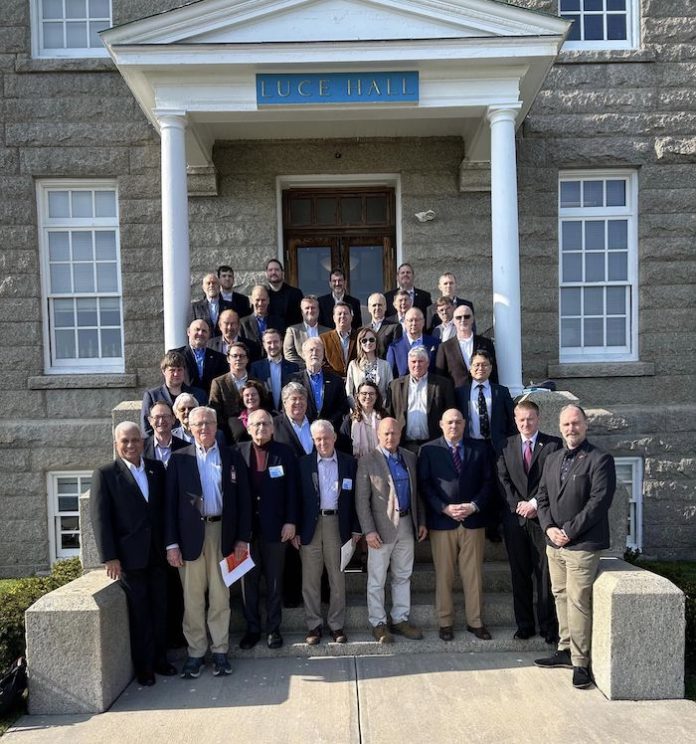
The U.S. Naval War College (NWC) hosted the third installment in the “Corbett 100” project, a conference series co-sponsored by the Laughton Naval Unit at King’s College London (KCL) and the Australian Naval Institute onboard Naval Station Newport, May 10 – 12. The first event was held at KCL while the second was the 2022 Goldrick Conference.
The Corbett 100 project marks the centenary of the death of British naval historian and maritime strategist Sir Julian Corbett, with an exploration of the influence of history upon sea power with an applied view to the future.
NWC’s Corbett 100 conference examined key historical foundations of maritime policy and naval strategy by revisiting the example provided by Corbett, whose work profoundly influenced Rear Admiral William S. Sims in his second presidency at NWC.
Welcoming the participants, Rear Admiral Shoshana Chatfield, president of NWC, charted the role of time in the technological advancement of the Navy, rife not only with challenges, but also noteworthy successes.
“The history of naval warfare is filled with examples of commanders who achieved victory by thinking outside the box and using unorthodox tactics,” said Chatfield. “Today, commanders must be prepared to embrace new technologies and adapt their strategies as the situation demands.”
Chatfield also charged participants to cultivate relationships with new and interested graduates and subject matter experts who could offer fresh ideas and energy for a robust conference experience.
Participants included historians, other academics and former serving military from the U.S., UK, Japan, India and Australia. During the conference they explored issues of immediate strategic focus for contemporary naval thinkers in anticipation of the future role of navies in peace and war.
Attendees participated in ten panels supported by more than 35 speakers covering topics which connected the study of history to modern strategic analysis.
A keynote presentation on “The Spectre of Navalism in the 21st Century” by Andrew Lambert, Laughton Professor of Naval History at Kings College London, provided reasons for Corbett’s importance in modern times.
“Corbett was a philosopher who created a concept of a British way of war and supported that through the creation of a ‘practical past,’” stated Lambert. He explained that this “practical past” is what is needed to “process the experiences we are having in the present or will have in the future.”
The location of the conference was especially apropos as the event took place in NWC’s Pringle Hall, a building steeped history and home to historic war gaming floors dating back to 1934. Here the college’s Historical Section, using a Corbett-inspired curriculum, influenced American naval strategy development during the years leading up to the Second World War.
David Kohnen, Ph.D., Associate Professor at NWC’s Center for Maritime Historical Research, spoke about how Corbett inspired Rear Admiral Sims to fuse unclassified historical analysis with current intelligence in order to educate NWC’s ‘five-star thinkers’ of the 1920s and 1930s. Among those benefiting from the historical-based curriculum were Admiral Chester W. Nimitz and Captain Ernest J. King, who completed the curriculum three times over the course of his career.
“Through this education, these leaders learned not to be what we might call ‘warfighters,’” Kohnen said. “Rather, they learned how to be ‘war winners’ into the Second World War and beyond.”
ANI President, Vice Admiral Peter Jones attended the conference with retired Admirals Sudarshan Shrikhande of the Indian Navy and Katsuya Yamamoto of Japan. Notably, Vice Admiral Jones also provided keynote remarks about the profound influence of former NWC research scholar, the late Rear Admiral James Goldrick, whose historical writings on strategy have influenced contemporary efforts to maintain maritime stability in the greater Indo-Pacific region.
Using the works of Corbett and other maritime thinkers of the past, NWC continues to build upon historical lessons to educate naval leaders of the twenty-first century and beyond.
NWC delivers excellence in education, research, and outreach, informing today’s decision-makers and educating tomorrow’s leaders. The college provides educational experiences and learning opportunities that develop students’ ability to anticipate and prepare strategically for the future, strengthen the foundations of peace, and create a decisive warfighting advantage.



